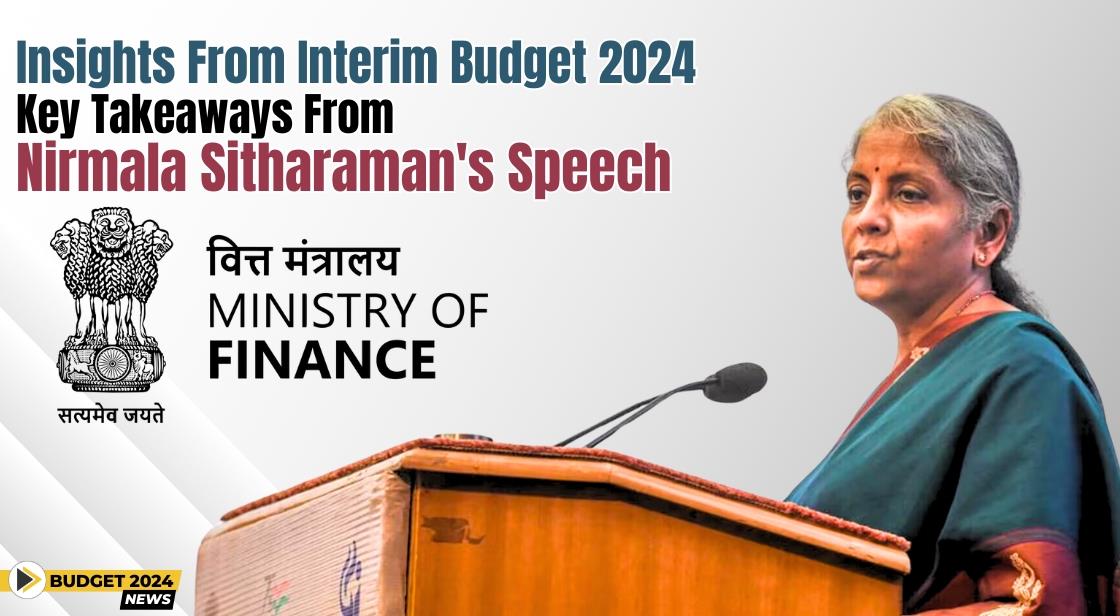Insights from Interim Budget 2024: Key Takeaways from Nirmala Sitharaman's Speech

News Synopsis
In a pivotal move before the upcoming 2024 Lok Sabha elections, Finance Minister Nirmala Sitharaman presented the Interim Budget 2024, outlining crucial proposals that touch various aspects of the economy. This budget maintains the existing taxation structure, offering a sense of relief for taxpayers while focusing on significant boosts to infrastructure spending and unveiling various welfare schemes.
Boosts to Infrastructure and Welfare:
In her address, Sitharaman emphasized a double-digit boost to infrastructure spending, heralding what she termed as the government's "golden moments" on the horizon. The proposed schemes include initiatives allowing individuals to buy or construct homes, free electricity through a rooftop solar program, and enhanced medical coverage for select government workers.
Additionally, plans were announced to augment milk and dairy production in India, acknowledging its status as the world's largest milk producer but emphasizing the need for increased productivity.
Agricultural Strategies and Value Addition:
Sitharaman also shed light on the government's strategic plans for Atma Nirbharta in oilseeds production, emphasizing value addition in the agriculture sector. Efforts to increase farmers' income and promote value addition in the agriculture sector were highlighted as key priorities.
Taxation Structure and Continuing Benefits:
The Finance Minister retained the existing taxation structure, refraining from making changes in direct and indirect taxes, including import duties. However, to ensure continuity, Sitharaman proposed extensions for certain tax benefits, such as those for startups and investments made by sovereign wealth or pension funds, with the expiration date extended to March 31, 2025.
Sitharaman stated, "I propose to retain the same tax rates for direct and indirect taxes, including import duties. However, certain tax benefits to startups and investments made by sovereign wealth or pension funds...are expiring on March 31, 2024; to provide continuity, I propose to extend the date to March 31, 2025."
Welfare Priorities:
The Finance Minister reiterated the government's focus on comprehensive GDP, referring to governance, development, and performance. She emphasized the need to prioritize the needs, aspirations, and welfare of the poor, women, youth, and farmers. Notable achievements, such as lifting 250 million people out of poverty in the past decade and benefits reaching 40 million farmers through the crop insurance scheme, were highlighted.
Economic Growth and Future Vision:
Sitharaman expressed optimism about India's economic growth, stating that the next five years will witness unprecedented development and golden moments, aligning with the vision of a developed India by 2047. The government aims to make the 'Viksit Bharat' (developed country) by 2047, she added.
Fiscal Outlook and Investment Plans:
Key fiscal indicators include a lower-than-targeted fiscal deficit of 5.8% of GDP for FY24, projected to reduce further to 5.1% in FY25 and a target of 4.5% by FY26. The government plans to invest significantly in the tourism sector, with a specific focus on improving tourist infrastructure in the island Union Territory of Lakshadweep.
Key points from the budget 2024 speech:
-
No Changes in Taxation: Sitharaman announced no modifications to direct or indirect tax structures, providing relief to taxpayers. Existing tax benefits for startups, sovereign wealth funds, and pension funds were extended until March 2025.
-
Infrastructure Boost: A double-digit increase in infrastructure spending was declared, aiming to accelerate India's economic growth.
-
Focus on Four Key Groups: The budget prioritized "garib" (the poor), "mahilayen" (women), "yuva" (the youth), and "annadata" (farmers), with several welfare schemes planned.
-
Economic Optimism: Sitharaman projected India's economy to undergo "unprecedented" growth in the next five years, fueled by reforms and a widening tax base.
-
Sustainable Development: The budget emphasized clean energy initiatives like rooftop solar programs and plans to increase milk and dairy production.
-
Housing for All: The government pledged to build 20 million affordable houses in the next five years, adding to the existing 30 million.
-
Tourism Boost: Significant investments were promised for the tourism sector, with special focus on developing Lakshadweep Island.
-
Fiscal Consolidation: The government revised the FY24 fiscal deficit target downward to 5.8% and set a 5.1% target for FY25, aiming to reach 4.5% by FY26.
Looking Ahead:
The Interim Budget 2024 prioritizes fiscal stability, infrastructural development, and social welfare while maintaining tax continuity. As India progresses towards the 2024 elections, it remains to be seen how these measures will translate into tangible outcomes and contribute to the nation's overall progress.
You May Like









